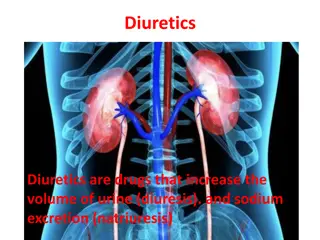
Understanding Hypokalemia: Causes, Symptoms, and Treatment
Explore the definition, causes, symptoms, and treatment options for hypokalemia, a condition characterized by low blood potassium levels. Learn why maintaining proper potassium levels is essential for the body's functioning.
Download Presentation

Please find below an Image/Link to download the presentation.
The content on the website is provided AS IS for your information and personal use only. It may not be sold, licensed, or shared on other websites without obtaining consent from the author. If you encounter any issues during the download, it is possible that the publisher has removed the file from their server.
You are allowed to download the files provided on this website for personal or commercial use, subject to the condition that they are used lawfully. All files are the property of their respective owners.
The content on the website is provided AS IS for your information and personal use only. It may not be sold, licensed, or shared on other websites without obtaining consent from the author.
E N D
Presentation Transcript
StudyMafia.Org Hypokalemia Submitted Studymafia.org Studymafia.org Submitted To: To: Submitted By Submitted By: : Studymafia.org Studymafia.org
Table Contents Definition Introduction Symptoms of Hypokalemia Why Hypokalemia? Causes of Hypokalemia Diagnosis of Hypokalemia Treatment of Hypokalemia Conclusion 2
Definition Hypokalemia is when the amount of potassium in your blood is too low. 3
Introduction Normal levels of potassium for an adult range from 3.5 to 5.2 mEq/L (3.5 to 5.2 mmol/L). Anything lower than 3 mEq/L (3 mmol/L) may be considered severe hypokalemia. Potassium is an electrolyte. Electrolytes are minerals that carry an electric charge when they re dissolved in your bodily fluids. Your body needs potassium for your cells, muscles and nerves to function correctly. Your body gets potassium through the food you eat. 4
Why Hypokalemia? You need potassium to keep your muscles, nerves and heart working well. You also need potassium for a healthy digestive system and bone health. Low levels of potassium can affect these important functions in your body. Over time, low levels of potassium in your body can cause effects such as abnormal heart rhythms, muscle weakness and even paralysis. 6
Causes of Hypokalemia Low blood potassium typically occurs because of an excessive loss of potassium in your digestive tract. This may be due to frequent vomiting, diarrhea or laxative use. Other causes of hypokalemia include: Eating disorders, such as bulimia nervosa. Excessive sweating (hyperhidrosis). 7
Causes of Hypokalemia Alcohol use disorder. Water pills (diuretics). Diuretics can cause too much potassium to be expelled through your pee (urine). Other medications such as insulin, certain antibiotics and corticosteroids. Adrenal disorders, such as primary aldosteronism and Cushing s syndrome. Chronic kidney disease. 8
Causes of Hypokalemia Low magnesium levels (hypomagnesemia). Certain kidney conditions, such as Bartter s syndrome and Gitelman syndrome. Both are rare genetic kidney disorders that cause imbalances in your body. Other conditions such as Liddle syndrome, a rare disorder that causes increased blood pressure. Rarely, not getting enough potassium due to a poor diet. 9
Diagnosis of Hypokalemia Your healthcare provider will check your potassium level through a blood test. The normal potassium level for an adult ranges from 3.5 to 5.2 mEq/L (3.5 to 5.2 mmol/L). Potassium levels between 3 and 3.5 mEq/L (3 to 3.5 mmol/L) are considered mild hypokalemia. Anything lower than 3 mEq/L (3 mmol/L) is considered severe hypokalemia. 10
Diagnosis of Hypokalemia Your healthcare provider may also order a basic or comprehensive metabolic panel. This panel is a group of blood tests that determine your body's kidney function and electrolyte balance. If hypokalemia is confirmed, your healthcare provider will try to determine the cause. 11
Diagnosis of Hypokalemia If the cause isn t clear, they may order a urine test (urinalysis) to measure the amount of potassium in your urine. Your healthcare provider may also order an electrocardiogram (ECG or EKG). An ECG measures your heart rhythm. Hypokalemia can cause abnormal heart rhythms. An ECG can pick up the abnormal heart rhythms. 12
Treatment of Hypokalemia If you have a mild case of hypokalemia, your healthcare provider will prescribe a potassium supplement that you ll take by mouth. If your case is more severe, your healthcare provider may give you potassium through your vein (intravenously). 13
Treatment of Hypokalemia Reasons you may need potassium through your vein include: Your potassium level is extremely low. Hypokalemia is causing abnormal heart rhythms. Supplements taken by mouth aren t working. You re losing more potassium than can be replaced with supplements taken by mouth. 14
Treatment of Hypokalemia Your healthcare provider will also treat any condition that s causing hypokalemia. If you need to take a diuretic, your healthcare provider may switch you to a type that keeps potassium in your body. They may also tell you to take extra potassium supplements. 15
Conclusion When you have hypokalemia, the amount of potassium in your blood is too low. Your body needs potassium to function correctly. Hypokalemia can affect your cells, muscles, nerves, digestive system and skeletal system. To ensure you have enough potassium, work with your healthcare provider to make sure you re eating enough foods that contain the mineral. 16
Google.com Wikipedia.org Studymafia.org Slidespanda.com





